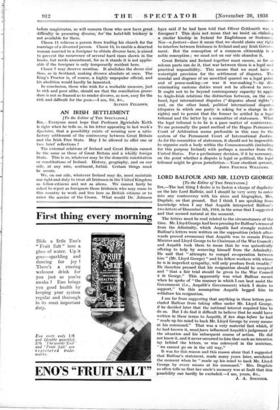LORD BALFOUR AND MR. LLOYD GEORGE [To the Editor of
THE SPECTATOR.] SIR,—The last thing I desire' is to fasten a charge of duplicity on the late Lord Balfour, and I should be-very sorry to enter into any controversy with his niece and biographer, Mrs. Dugdale, on that ground. But i think I am speaking from knowledge when I say that Asquith interpreted Balfour's two letters of December 5th, 1916, in the sense that I suggested
and that seemed natural at the moment. -
The letters must be read related to the circumstances of the time. Mr. Lloyd George had been pressing for Balfour's removal from the Admiralty, which Asquith had strongly resisted. Balfour's letters were written on the supposition (which after- wards proved erroneous) that Asquith was to remain Prime Minister and Lloyd George to be Chairman of the War Council ; and Asquith took them to mean flint he was quixotically offering to help by removing himself from the Admiralty. He said that " attempts to compel co-operation between him " (Mr. Lloyd George) " and his fellow-workers with whom he is in imperfect sympathy, will only produce fresh trouble." He therefore pressed that his resignation should be accepted and " that a fair trial should be given to the War Council a la George." This apparently was what Balfour meant when he spoke of "the manner in which I can best assist the Government (i.e., Asquith's Government) which I desire to support." On this assumption Asquith begged him to withdraw his resignation. _ I am far from suggesting that anything in these letters pre- cluded Balfour from taking office under Mr. Lloyd George, if he decided later that the national interest required him to do so. But I do find it difficult to believe that he could have written in these terms to Asquith, _if two days before he had " made up his mind to back Mr. Lloyd George by every means at his command." That was a very material fact which, if he had known it, must have influenced Asquith's judgement of the situation and his subsequent course of action. He did not know it, and it never occurred to him that such an intention lay behind the letters, -or Was conveyed in the "sentence,
we cannot go on in the old way." It was for this reason and this reason alone that I suggested that Balfour's statement, made many years later, antedated the moment when he " made up his mind to back Mr. Lloyd George by every means at his command." Mrs. Dugdale so often tells us that her uncle's memory was at fault that this possibility can hardly be excluded:4 am, yours, &c.,
J. A. SPENDER.




























































 Previous page
Previous page